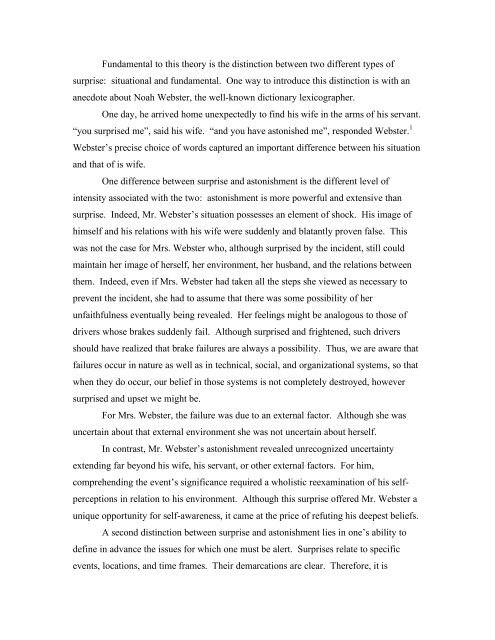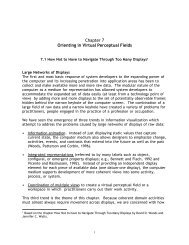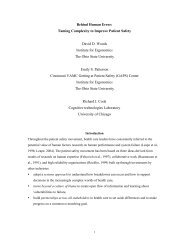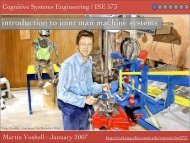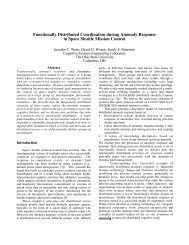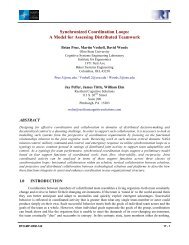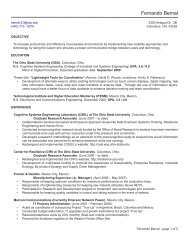Fundamental Surprises Zvi Lanir Decision Research 1201 Oak ...
Fundamental Surprises Zvi Lanir Decision Research 1201 Oak ...
Fundamental Surprises Zvi Lanir Decision Research 1201 Oak ...
- No tags were found...
Create successful ePaper yourself
Turn your PDF publications into a flip-book with our unique Google optimized e-Paper software.
<strong>Fundamental</strong> to this theory is the distinction between two different types of<br />
surprise: situational and fundamental. One way to introduce this distinction is with an<br />
anecdote about Noah Webster, the well-known dictionary lexicographer.<br />
One day, he arrived home unexpectedly to find his wife in the arms of his servant.<br />
“you surprised me”, said his wife. “and you have astonished me”, responded Webster. 1<br />
Webster’s precise choice of words captured an important difference between his situation<br />
and that of is wife.<br />
One difference between surprise and astonishment is the different level of<br />
intensity associated with the two: astonishment is more powerful and extensive than<br />
surprise. Indeed, Mr. Webster’s situation possesses an element of shock. His image of<br />
himself and his relations with his wife were suddenly and blatantly proven false. This<br />
was not the case for Mrs. Webster who, although surprised by the incident, still could<br />
maintain her image of herself, her environment, her husband, and the relations between<br />
them. Indeed, even if Mrs. Webster had taken all the steps she viewed as necessary to<br />
prevent the incident, she had to assume that there was some possibility of her<br />
unfaithfulness eventually being revealed. Her feelings might be analogous to those of<br />
drivers whose brakes suddenly fail. Although surprised and frightened, such drivers<br />
should have realized that brake failures are always a possibility. Thus, we are aware that<br />
failures occur in nature as well as in technical, social, and organizational systems, so that<br />
when they do occur, our belief in those systems is not completely destroyed, however<br />
surprised and upset we might be.<br />
For Mrs. Webster, the failure was due to an external factor. Although she was<br />
uncertain about that external environment she was not uncertain about herself.<br />
In contrast, Mr. Webster’s astonishment revealed unrecognized uncertainty<br />
extending far beyond his wife, his servant, or other external factors. For him,<br />
comprehending the event’s significance required a wholistic reexamination of his selfperceptions<br />
in relation to his environment. Although this surprise offered Mr. Webster a<br />
unique opportunity for self-awareness, it came at the price of refuting his deepest beliefs.<br />
A second distinction between surprise and astonishment lies in one’s ability to<br />
define in advance the issues for which one must be alert. <strong>Surprises</strong> relate to specific<br />
events, locations, and time frames. Their demarcations are clear. Therefore, it is


